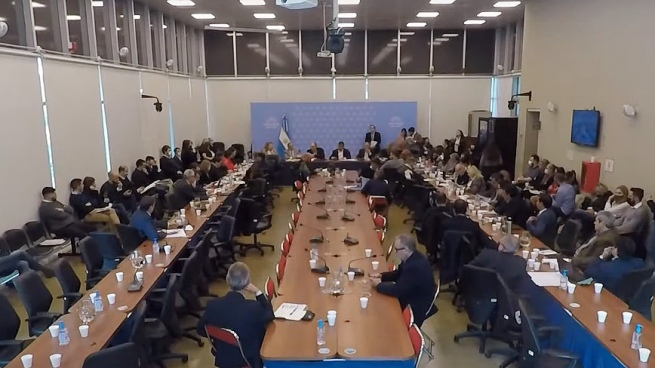The Front of All (FdT) managed this Tuesday in a plenary session of commissions of the Chamber of Deputies to issue a majority opinion on the reform project of the Argentine Buy Law, which aims to promote the greater participation of national production in the public purchases and stimulate processes of innovation and generation of added value in strategic sectors, so the initiative was in a position to be debated by the plenary of the body.
The project presented by the Executive Power and promoted by the ruling party was signed by 40 legislators from the Budget and Finance and Industry commissions39 from the FdT plus the support of the representative of the Concord Front of Misiones.
While, the proposal of Together for Change, of total rejection of the project, was endorsed by the 38 members that the opposition bloc has in both commissions.
Of the eighty signatures that make up the legislative working group that addressed the issue, the deputy of Córdoba Federal/Federal Interbloc, Ignacio García Aresca, did not adhere to either of the two texts, with double incidence for being part of both commissions.
The president of the Industry commission, Marcelo Casaretto (FdT), explained the central guidelines of the project, as well as the latest modifications made to the original text of the Executive Branch by ensuring that it seeks to improve “the preference raised by the current law, taking it to 15% for all national companies, expanded to 20% for MSMEs, and an additional preference of 3% is added for companies that have women in their leadership, comply with environmental development guidelines sustainable and meet regional requirements”accurate.
From Together for Change, the deputy Alejandro Cacace (Radical Evolution) considered that “the proposal made by the Executive Branch is to expand the margin of preference, this is what we do not find justified and we find no answer why to do it”.
“We talk about ‘Buy Expensive’ because with what is being proposed effectively we can end up paying much more than what the market prices are,” summed up the radical legislator.
In response to Cacace, the deputy Victoria Tolosa Paz (FdT) defended the project, considering “that this traction pulley of the State is going to make the industries of the north able to develop quality and formal employment. We need to build a predictable and efficient Argentina, not only in the search for price, but also in something fundamental such as the strategic role of the State”.
?? BUY ARGENTINE. We approve opinion 40 in favor to 38 against. Today we sign the opinion of the Commission on Industry and Budget and Finance. I was as President of the Plenary, promoting the approval of this project of the Executive Power.@Deputies_All pic.twitter.com/RNuhgN5HSX
– Marcelo Casaretto (@mpcasaretto) May 24, 2022
From the opposition, deputy Laura Rodríguez Machado (PRO) criticized the initiative: “Let’s not disguise a subsidy for SMEs, with a ‘Buy Expensive’ benefit, if we want to benefit SMEs we have to look for general instruments to benefit the whole of the framework”.
From the ruling party, the president of the Budget Commission and deputy of the Frente de Todos, Carlos Heller, said -with an ironic tone-. that “it seems that we came with an inflexible project but the first thing we heard was the subject of the inclusion of the PAMI and we took it out. And it cannot be said so lightly that it is the ‘Buy Expensive’”.
“When Buy Argentine is privileged, Argentine work is privileged, which in turn generates Argentine consumption and that in turn generates tax revenue,” Heller continued, concluding that “laws are always made or should be made with the criteria of protecting the weakest, because the powerful do not need the laws, they win with the market”.

In her turn, the deputy Carolina Yutrovic (FdT) considered that “the project not only proposes purchases, but also a system for the development of industries”. “We are going to involve a financing of those companies that go towards innovation, it adds a lot of value to a system of public purchases that already existed,” she said.
“We will see each other in the room, when the topic is included in the agenda of the next session. To continue working for the national industry,” said Casaretto when ending the plenary session and anticipating the intention of the ruling party to advance with the project approval.
To achieve that goal the ruling party would need to add support to reach the necessary quorum, so the position adopted by the Federal Interbloc is key, where in informal negotiations they raised objections about “the differences between large companies and SMEs, the possibility of making electronic invoices and the amount allocated for the system’s trust”.
The initiative that the ruling party seeks to sanction contemplates the possibility of choosing a national company as a supplier despite the fact that its prices exceed -up to a certain limit- the proposals that foreign companies can make.
Through its implementation, the Government estimates that it could save US$500 million by prioritizing the purchase of national products.
One of the central points is that it raises the budget preferences proposed by national micro, small and medium-sized enterprises (MSMEs) -from 15% to 20%-, while the others go from 8% to 15%.
The deputies of the interbloc Together for Change Germana Maria Figueroa Casas, José Carlos Núñez, Víctor Hugo Romero, Pedro Jorge Galimberti, Ingrid Jetter, Miguel Ángel Bazze and Graciela Ocaña also spoke at this Tuesday’s meeting. And the legislators of the Frente de Todos Carolina Yutrovic, Sergio Casas, Guillermo Carnaghi and Eduardo Toniolli, among others.


















